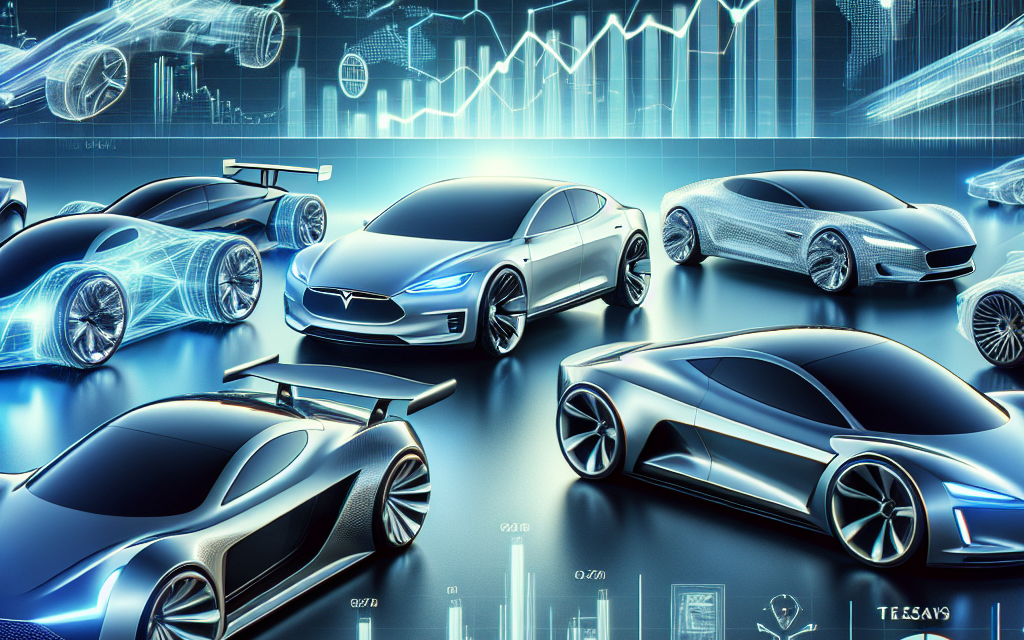“Discover the Future: Uncovering the Next Big Car Stocks Beyond Tesla for 2025!”
Introduction
As the electric vehicle (EV) market continues to expand, investors are increasingly looking beyond Tesla to identify promising car stocks that could thrive in 2025 and beyond. With a growing emphasis on sustainability, technological innovation, and changing consumer preferences, several automakers are positioning themselves to capture significant market share in the EV landscape. This exploration delves into emerging players, established manufacturers pivoting towards electrification, and the factors driving their potential success in a rapidly evolving industry. By examining these companies, investors can uncover opportunities that may offer substantial returns as the automotive sector undergoes a transformative shift.
Rivian: The Future of Electric Trucks
As the automotive industry undergoes a significant transformation towards electrification, Rivian has emerged as a noteworthy contender in the electric vehicle (EV) market, particularly in the realm of electric trucks. Founded in 2009, Rivian has positioned itself as a pioneer in the production of electric adventure vehicles, with a focus on sustainability and innovative technology. The company’s flagship models, the R1T electric pickup truck and the R1S electric SUV, have garnered considerable attention and acclaim, setting the stage for Rivian’s potential growth in the coming years.
One of the most compelling aspects of Rivian is its commitment to producing vehicles that cater to outdoor enthusiasts and adventure seekers. The R1T, for instance, is designed with features that enhance its off-road capabilities, such as a quad-motor system that provides exceptional torque and traction. This focus on adventure aligns with a growing consumer trend towards outdoor activities, making Rivian’s offerings particularly appealing to a demographic that values both performance and sustainability. As more consumers seek vehicles that can accommodate their active lifestyles while minimizing their environmental impact, Rivian stands to benefit significantly.
Moreover, Rivian’s strategic partnerships and investments further bolster its position in the electric truck market. The company has secured substantial funding from prominent investors, including Amazon and Ford, which not only provides financial backing but also opens doors to collaborative opportunities. For instance, Amazon has placed a significant order for electric delivery vans, which Rivian is set to produce. This partnership not only enhances Rivian’s production capabilities but also solidifies its reputation as a key player in the commercial electric vehicle sector. As the demand for sustainable delivery solutions continues to rise, Rivian’s involvement in this space could lead to substantial revenue growth.
In addition to its innovative vehicle designs and strategic partnerships, Rivian is also investing in the development of a robust charging infrastructure. The company has announced plans to establish a network of fast-charging stations, known as the Rivian Adventure Network, which will cater specifically to its customers. This initiative is crucial, as the availability of charging stations is often a significant concern for potential EV buyers. By addressing this issue, Rivian not only enhances the ownership experience for its customers but also positions itself as a forward-thinking company that prioritizes convenience and accessibility.
Looking ahead to 2025, Rivian’s growth potential appears promising, particularly as the electric truck market continues to expand. With increasing consumer awareness of climate change and a growing preference for sustainable transportation options, the demand for electric trucks is expected to rise. Rivian’s unique positioning as a manufacturer of electric adventure vehicles, combined with its strategic partnerships and commitment to infrastructure development, suggests that the company is well-equipped to capitalize on this trend.
In conclusion, Rivian represents a compelling opportunity for investors seeking exposure to the electric vehicle market beyond Tesla. With its focus on adventure-oriented electric trucks, strategic collaborations, and proactive approach to charging infrastructure, Rivian is poised to make a significant impact in the automotive landscape. As the company continues to innovate and expand its offerings, it is likely to attract a loyal customer base and establish itself as a leader in the electric truck segment. As we move towards 2025, Rivian’s trajectory will be one to watch closely, as it embodies the future of sustainable transportation.
Lucid Motors: Luxury EVs on the Rise
As the electric vehicle (EV) market continues to expand, Lucid Motors has emerged as a noteworthy contender, particularly in the luxury segment. Founded in 2007, the company has positioned itself as a direct competitor to established luxury automakers while also challenging the dominance of Tesla. With its flagship model, the Lucid Air, the company has garnered significant attention for its innovative design, impressive performance metrics, and advanced technology features. As we look toward 2025, Lucid Motors is poised to capitalize on the growing demand for high-end electric vehicles, making it a compelling option for investors seeking alternatives to Tesla.
One of the standout features of the Lucid Air is its remarkable range, which is a critical factor for consumers considering an electric vehicle. The Lucid Air Dream Edition boasts an EPA-estimated range of up to 503 miles on a single charge, a figure that not only surpasses many competitors but also addresses one of the primary concerns potential EV buyers have: range anxiety. This impressive range is complemented by rapid charging capabilities, allowing drivers to recharge their vehicles quickly and efficiently. Such attributes position Lucid Motors as a leader in the luxury EV market, appealing to consumers who prioritize both performance and convenience.
In addition to its impressive range, Lucid Motors has focused on creating a luxurious driving experience that rivals traditional high-end vehicles. The interior of the Lucid Air is designed with meticulous attention to detail, featuring premium materials, spacious seating, and cutting-edge technology. The vehicle is equipped with a large, curved glass display that serves as the central control hub, integrating navigation, entertainment, and vehicle settings seamlessly. This emphasis on luxury and technology not only enhances the driving experience but also aligns with the expectations of discerning consumers in the luxury market.
Moreover, Lucid Motors has made significant strides in establishing its manufacturing capabilities. The company’s state-of-the-art factory in Casa Grande, Arizona, is designed to produce vehicles at scale while maintaining high-quality standards. As production ramps up, Lucid is expected to meet the increasing demand for its vehicles, which is crucial for its growth trajectory. The company has also announced plans to expand its product lineup, including the introduction of more affordable models that could attract a broader customer base. This strategic diversification is essential for capturing market share in an increasingly competitive landscape.
As we consider the broader context of the automotive industry, the shift toward electrification is undeniable. Governments worldwide are implementing stricter emissions regulations and offering incentives for EV adoption, further propelling the market forward. Lucid Motors is well-positioned to benefit from these trends, particularly as consumers become more environmentally conscious and seek sustainable alternatives to traditional gasoline-powered vehicles. The company’s commitment to sustainability is evident in its manufacturing processes and the materials used in its vehicles, appealing to a growing demographic of eco-conscious consumers.
In conclusion, Lucid Motors represents a promising investment opportunity in the luxury electric vehicle sector as we approach 2025. With its focus on innovation, performance, and sustainability, the company is not only challenging established players like Tesla but also carving out its niche in the luxury market. As consumer preferences continue to evolve and the demand for electric vehicles rises, Lucid Motors is poised to thrive, making it a noteworthy stock to consider for those looking to diversify their portfolios beyond Tesla.
Ford: Traditional Automaker’s Electric Transformation
As the automotive industry undergoes a significant transformation, traditional automakers are increasingly pivoting towards electric vehicles (EVs) to remain competitive in a rapidly evolving market. Among these companies, Ford stands out as a prime example of a legacy manufacturer embracing the electric revolution. With a rich history in automotive innovation, Ford is not only adapting to the changing landscape but is also positioning itself as a formidable player in the electric vehicle sector by 2025.
Ford’s commitment to electrification is evident in its ambitious plans to invest over $50 billion in electric and hybrid vehicle development through 2026. This substantial financial commitment underscores the company’s recognition of the growing demand for sustainable transportation solutions. By reallocating resources and reimagining its product lineup, Ford aims to capture a significant share of the EV market, which is projected to expand dramatically in the coming years. The company has already introduced several electric models, including the Mustang Mach-E and the all-electric Ford F-150 Lightning, both of which have garnered positive reviews and consumer interest.
Transitioning from traditional internal combustion engines to electric powertrains is no small feat, and Ford is leveraging its extensive experience in manufacturing and engineering to facilitate this shift. The company has established a dedicated team focused on EV development, ensuring that it can deliver vehicles that meet the performance, safety, and reliability standards that consumers expect from the Ford brand. This strategic approach not only enhances Ford’s credibility in the EV market but also allows it to build on its legacy of producing durable and dependable vehicles.
Moreover, Ford’s collaboration with technology partners plays a crucial role in its electric transformation. By forming alliances with companies specializing in battery technology and software development, Ford is enhancing its capabilities in creating cutting-edge electric vehicles. These partnerships enable Ford to innovate rapidly and integrate advanced features into its EVs, such as autonomous driving capabilities and enhanced connectivity options. As a result, Ford is not merely following the trend of electrification; it is actively shaping the future of mobility.
In addition to its focus on electric vehicles, Ford is also committed to sustainability across its operations. The company has set ambitious goals to reduce carbon emissions and improve energy efficiency in its manufacturing processes. By adopting sustainable practices, Ford aims to minimize its environmental impact while simultaneously appealing to a growing segment of environmentally conscious consumers. This holistic approach to sustainability not only enhances Ford’s brand image but also positions it favorably in a market that increasingly values corporate responsibility.
As Ford continues to roll out new electric models and expand its EV infrastructure, including charging networks, it is poised to compete effectively against established players like Tesla. The company’s strategic investments and innovative product offerings are likely to resonate with consumers looking for reliable and sustainable transportation options. Furthermore, as the global push for electrification intensifies, Ford’s proactive stance in the EV market may yield significant dividends by 2025 and beyond.
In conclusion, Ford’s transformation from a traditional automaker to a leader in electric vehicles exemplifies the broader shift occurring within the automotive industry. By investing heavily in electrification, leveraging partnerships, and committing to sustainability, Ford is not only adapting to the changing landscape but is also setting the stage for future success. As the company continues to innovate and expand its electric vehicle offerings, it is well-positioned to capture the attention of investors and consumers alike, making it a promising stock to watch in the coming years.
NIO: China’s Growing Influence in the EV Market
As the electric vehicle (EV) market continues to expand, NIO has emerged as a significant player, particularly within the Chinese automotive landscape. Founded in 2014, NIO has quickly positioned itself as a formidable competitor to established brands, including Tesla. The company’s innovative approach to electric mobility, coupled with its commitment to sustainability, has garnered considerable attention from investors and consumers alike. As we look toward 2025, NIO’s influence in the EV market is expected to grow, driven by several key factors.
One of the most compelling aspects of NIO’s strategy is its focus on high-performance electric vehicles. The company has developed a range of models that not only meet the demands of environmentally conscious consumers but also appeal to those seeking luxury and performance. For instance, the NIO ES8 and ES6 SUVs have received accolades for their design, technology, and driving experience. This emphasis on quality and performance positions NIO favorably against competitors, particularly as consumer preferences shift toward premium electric vehicles.
Moreover, NIO’s commitment to innovation is evident in its battery-swapping technology, which sets it apart from many other EV manufacturers. This system allows drivers to exchange depleted batteries for fully charged ones in a matter of minutes, significantly reducing downtime and addressing one of the primary concerns associated with electric vehicle ownership: charging time. As the infrastructure for EV charging continues to develop, NIO’s battery-swapping stations could become a critical advantage, particularly in urban areas where convenience is paramount.
In addition to its technological advancements, NIO is benefiting from the rapid growth of the Chinese EV market. China has become the largest market for electric vehicles globally, driven by government policies aimed at reducing emissions and promoting sustainable transportation. The Chinese government has implemented various incentives for EV buyers, including subsidies and tax breaks, which have spurred demand. As a result, NIO is well-positioned to capitalize on this trend, especially as it expands its production capabilities and product offerings.
Furthermore, NIO’s strategic partnerships and collaborations enhance its market presence. The company has formed alliances with various technology firms and automotive suppliers, enabling it to leverage cutting-edge technologies and streamline its operations. These partnerships not only bolster NIO’s research and development efforts but also enhance its supply chain resilience, which is crucial in an industry often affected by global supply chain disruptions.
Looking ahead to 2025, NIO’s expansion plans are ambitious. The company aims to enter international markets, including Europe and North America, where demand for electric vehicles is on the rise. By establishing a foothold in these regions, NIO can diversify its revenue streams and reduce its reliance on the Chinese market. This global expansion strategy is indicative of NIO’s long-term vision and its desire to become a leading player in the global EV landscape.
In conclusion, NIO’s growing influence in the electric vehicle market is a testament to its innovative approach, commitment to quality, and strategic positioning within the rapidly evolving automotive industry. As the demand for electric vehicles continues to surge, NIO’s unique offerings and forward-thinking strategies are likely to resonate with consumers and investors alike. With its sights set on international expansion and technological advancements, NIO is poised to play a pivotal role in shaping the future of electric mobility beyond 2025.
Fisker: Sustainable Innovation in Electric Vehicles
As the automotive industry undergoes a significant transformation towards electrification, Fisker Inc. emerges as a noteworthy contender in the electric vehicle (EV) market. Founded by Henrik Fisker, a renowned automotive designer with a rich history in luxury car design, the company aims to carve out a niche by focusing on sustainability and innovative technology. Fisker’s commitment to environmentally friendly practices is evident in its approach to vehicle production, which emphasizes the use of recycled materials and sustainable manufacturing processes. This dedication not only aligns with global trends towards sustainability but also positions Fisker as a forward-thinking player in the competitive EV landscape.
One of the most compelling aspects of Fisker’s strategy is its focus on creating vehicles that are not only eco-friendly but also appealing to consumers. The Fisker Ocean, the company’s flagship model, exemplifies this vision. With its sleek design and advanced features, the Ocean is designed to attract a broad audience, from environmentally conscious consumers to tech-savvy individuals. The vehicle boasts an impressive range, innovative infotainment systems, and a host of safety features, making it a strong competitor in the growing EV market. Furthermore, the Ocean’s production is set to take place in a carbon-neutral facility, reinforcing Fisker’s commitment to sustainability and responsible manufacturing.
In addition to its focus on sustainable production, Fisker is also leveraging cutting-edge technology to enhance the driving experience. The company has partnered with leading technology firms to integrate advanced software and connectivity features into its vehicles. This not only improves the overall user experience but also positions Fisker to compete with established players in the EV market, such as Tesla and Rivian. By prioritizing technology and user experience, Fisker aims to differentiate itself and attract a loyal customer base.
Moreover, Fisker’s business model is designed to be flexible and adaptive to market demands. The company has adopted a unique approach to vehicle production by utilizing a contract manufacturing model. This strategy allows Fisker to minimize capital expenditures while maintaining the ability to scale production as demand increases. By partnering with established manufacturers, Fisker can focus on design and innovation, ensuring that it remains agile in a rapidly evolving market. This approach not only reduces financial risk but also enables Fisker to respond quickly to consumer preferences and market trends.
Looking ahead to 2025, Fisker’s growth potential appears promising. The increasing global emphasis on sustainability and the transition to electric vehicles create a favorable environment for companies like Fisker. As governments around the world implement stricter emissions regulations and consumers become more environmentally conscious, the demand for electric vehicles is expected to rise significantly. Fisker’s commitment to sustainability, combined with its innovative designs and technology, positions it well to capitalize on this trend.
In conclusion, Fisker Inc. represents a compelling opportunity for investors and consumers alike as the automotive industry continues to evolve. With its focus on sustainable innovation, advanced technology, and a flexible business model, Fisker is poised to make a significant impact in the electric vehicle market. As we approach 2025, the company’s ability to navigate the challenges of the automotive landscape while remaining true to its core values will be crucial in determining its success. As such, Fisker stands out as a promising player in the realm of electric vehicles, offering a glimpse into the future of sustainable transportation.
BYD: Dominating the Global EV Landscape
As the electric vehicle (EV) market continues to expand, BYD has emerged as a formidable player, positioning itself as a dominant force in the global EV landscape. Founded in 1995, BYD, which stands for “Build Your Dreams,” has evolved from a battery manufacturer into one of the largest electric vehicle producers in the world. This transformation has been driven by a strategic focus on innovation, sustainability, and a commitment to reducing carbon emissions. As we look toward 2025, BYD’s trajectory suggests that it will play a crucial role in shaping the future of transportation.
One of the key factors contributing to BYD’s success is its comprehensive approach to electric mobility. The company not only manufactures passenger vehicles but also produces electric buses, trucks, and monorails, thereby catering to a diverse range of transportation needs. This diversification allows BYD to tap into various markets, from urban public transport to commercial logistics, thereby enhancing its revenue streams and market presence. Furthermore, BYD’s commitment to vertical integration—controlling the entire supply chain from battery production to vehicle assembly—enables it to maintain quality and reduce costs, giving it a competitive edge over other manufacturers.
In addition to its robust product lineup, BYD has made significant strides in expanding its global footprint. The company has established manufacturing facilities in several countries, including the United States, Brazil, and Hungary, which not only helps to meet local demand but also mitigates the impact of tariffs and trade barriers. This global strategy is complemented by strategic partnerships with local governments and businesses, facilitating the adoption of electric vehicles in various regions. As cities worldwide increasingly prioritize sustainable transportation solutions, BYD’s proactive approach positions it favorably to capitalize on these trends.
Moreover, BYD’s commitment to research and development is noteworthy. The company invests heavily in innovative technologies, particularly in battery technology, which is critical for enhancing the performance and range of electric vehicles. BYD’s proprietary Blade Battery technology, for instance, has garnered attention for its safety and efficiency, addressing one of the primary concerns associated with electric vehicles. By continuously improving its battery technology, BYD not only enhances the appeal of its vehicles but also contributes to the overall advancement of the EV industry.
As we approach 2025, the regulatory landscape surrounding electric vehicles is also evolving. Governments around the world are implementing stricter emissions regulations and offering incentives for EV adoption, creating a favorable environment for companies like BYD. The company’s ability to adapt to these regulatory changes and leverage government support will be crucial in maintaining its competitive position. Additionally, as consumer awareness of environmental issues grows, the demand for sustainable transportation options is expected to rise, further benefiting BYD.
In conclusion, BYD’s multifaceted approach to electric mobility, combined with its commitment to innovation and sustainability, positions it as a key player in the global EV market. As the industry continues to evolve, BYD’s strategic initiatives and global expansion efforts are likely to yield significant dividends. For investors looking beyond Tesla, BYD represents a compelling opportunity, with its strong market presence and forward-thinking strategies poised to drive growth in the coming years. As we look ahead to 2025, BYD’s influence on the electric vehicle landscape is expected to be profound, making it a company to watch in the rapidly changing automotive sector.
Polestar: Performance and Sustainability in Harmony
As the automotive industry continues to evolve, the spotlight often shines brightly on Tesla, a pioneer in electric vehicles (EVs). However, a growing number of companies are emerging as formidable contenders in the EV market, with Polestar being a notable example. Founded as a performance brand under the Volvo and Geely umbrella, Polestar has carved out a niche that emphasizes both high performance and sustainability, making it a compelling option for investors looking beyond Tesla in 2025.
Polestar’s commitment to sustainability is evident in its production processes and the materials it uses. The company aims to minimize its carbon footprint by employing eco-friendly practices throughout its supply chain. For instance, Polestar has made significant strides in reducing the environmental impact of its manufacturing facilities, utilizing renewable energy sources and implementing circular economy principles. This focus on sustainability not only aligns with global trends toward greener practices but also resonates with a growing consumer base that prioritizes environmental responsibility in their purchasing decisions.
In addition to its sustainability initiatives, Polestar is dedicated to delivering high-performance vehicles that do not compromise on driving experience. The Polestar 2, for example, has garnered attention for its impressive acceleration, handling, and overall driving dynamics. With a dual-motor setup that provides all-wheel drive, the Polestar 2 can accelerate from 0 to 60 mph in just over four seconds, showcasing the brand’s commitment to performance. This combination of speed and agility positions Polestar as a serious competitor in the EV market, appealing to driving enthusiasts who seek both excitement and eco-friendliness in their vehicles.
Moreover, Polestar’s innovative approach to technology further enhances its appeal. The brand has integrated advanced features into its vehicles, including a state-of-the-art infotainment system powered by Android, which offers seamless connectivity and access to a wide range of applications. This technological integration not only enhances the user experience but also positions Polestar as a forward-thinking brand that embraces the digital age. As consumers increasingly seek vehicles that offer both performance and cutting-edge technology, Polestar stands out as a brand that meets these demands.
Looking ahead to 2025, Polestar’s growth trajectory appears promising. The company has ambitious plans to expand its lineup, with the introduction of new models that cater to various segments of the market. For instance, the upcoming Polestar 3, an electric SUV, is expected to attract a broader audience, capitalizing on the growing demand for electric SUVs. This strategic expansion not only diversifies Polestar’s offerings but also positions the brand to capture a larger share of the EV market.
Furthermore, Polestar’s commitment to transparency and accountability in its sustainability efforts is noteworthy. The company has set clear targets for reducing its carbon emissions and is actively working towards achieving these goals. By publishing detailed sustainability reports, Polestar demonstrates its dedication to responsible business practices, which can enhance its reputation and attract environmentally conscious consumers.
In conclusion, as investors look for promising car stocks beyond Tesla for 2025, Polestar emerges as a strong candidate. With its harmonious blend of performance and sustainability, innovative technology, and strategic growth plans, Polestar is well-positioned to thrive in the competitive EV landscape. As the automotive industry continues to shift towards electrification, Polestar’s unique value proposition may resonate with both consumers and investors alike, making it a brand to watch in the coming years.
Q&A
1. **Question:** Which car manufacturers are considered promising alternatives to Tesla for 2025?
**Answer:** Companies like Rivian, Lucid Motors, Ford, General Motors, NIO, and BYD are considered promising alternatives.
2. **Question:** What factors contribute to the potential success of these car stocks?
**Answer:** Factors include advancements in electric vehicle (EV) technology, strong production capabilities, strategic partnerships, and expanding market presence.
3. **Question:** How is Ford positioning itself in the EV market for 2025?
**Answer:** Ford is investing heavily in EV development, launching models like the Ford F-150 Lightning and expanding its EV lineup with significant production targets.
4. **Question:** What role does government policy play in the growth of car stocks beyond Tesla?
**Answer:** Government incentives for EV adoption, emissions regulations, and infrastructure development for charging stations significantly impact the growth of these stocks.
5. **Question:** How does NIO differentiate itself in the competitive EV market?
**Answer:** NIO focuses on premium electric vehicles, battery-swapping technology, and a strong presence in the Chinese market, which is crucial for its growth.
6. **Question:** What challenges do these car manufacturers face in 2025?
**Answer:** Challenges include supply chain disruptions, competition from established automakers, and the need for continuous innovation in battery technology.
7. **Question:** Why is BYD considered a strong contender in the EV market?
**Answer:** BYD has a diverse product range, strong manufacturing capabilities, and significant investments in battery technology, making it a formidable player in the EV sector.
Conclusion
In conclusion, exploring promising car stocks beyond Tesla for 2025 reveals a diverse landscape of opportunities driven by advancements in electric vehicles, autonomous technology, and sustainable practices. Companies like Rivian, Lucid Motors, and traditional automakers pivoting towards electrification, such as Ford and General Motors, are well-positioned to capitalize on the growing demand for innovative transportation solutions. As the automotive industry continues to evolve, investors should consider a range of factors, including technological advancements, market trends, and regulatory environments, to identify potential winners in this dynamic sector.





